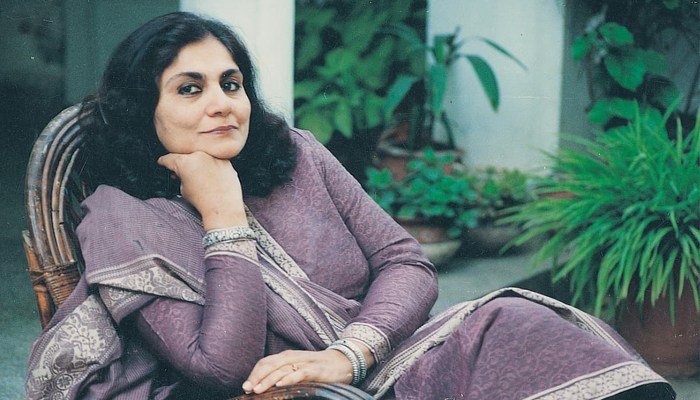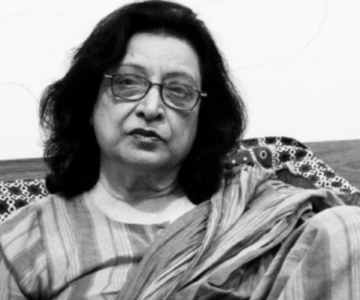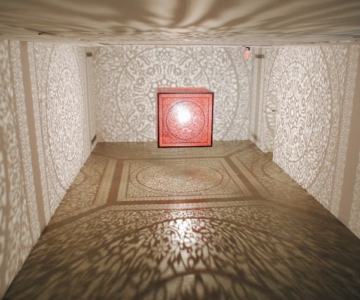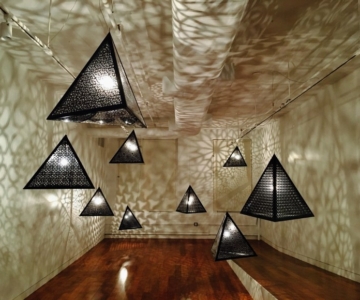April 29, 2018: Another light out
It is difficult to remember a friend who left so suddenly. And one I will never see again. Nearly 25 years ago I met Madeeha Gauhar (Aliki as we all called her) in Lahore — and we never looked back. Our comradeship grew and turned into a unyielding bond. Gauhar was a powerhouse of energy, wit, and above all creativity. One rarely finds friends who are so inspirational and supportive. And I am grateful that I had one. Yet I am heartbroken that since I moved abroad in 2014, we were not regularly in touch.
The hallmark of Madeeha Gauhar’s life was that it was fully lived. From her early years of activism to the emergence of Ajoka as a globally acclaimed theatre group, it was her energy and focused dedication that made it all happen. But she could not have done this without the support and full involvement of her quiet and exceptionally talented husband Shahid Nadeem — the playwright and her constant muse.
Ajoka’s origins are located in the wider political resistance to Gen. Zia’s dictatorship. In the early 1980s they staged an adaptation of Badal Sircar’s “Jaloos” that exposed the connivance of the ruling elite — and its foreign imperialist masters — to hoodwink the public and protect the prevailing unjust system. This procession of military, mullahs, leaders and businessmen continues to date.
In 1988 General Zia died in an air crash, and eleven years of dictatorship finally ended. Ajoka however captured the sadness of times in its myriad performances whereby despite the return of quasi-democracy the masses effectively remained alienated from the political process. The decade-long game of musical chairs was interrupted by General Musharraf’s coup in 1999. However, the devastating legacy of the Zia era continued to haunt in the form of extremism, sectarianism and terrorism.
‘I stand there and in that moment I face up to the bitter reality that my conscience is of no consequence, my secular convictions, progressive ideals, a lifetime of activism, of standing up for justice and the truth are all going to be compromised. I am being coerced to validate an ideology so dehumanising, so demeaning and so intolerant that my whole being revolts against it. With trembling hands and a sense of impotent rage I sign and walk out of the building feeling utterly humiliated and defeated’
Ajoka’s plays turned into significant parables of contemporary Pakistan. For instance, Chaak Chakkar has been staged many times and its critique of the political and judicial systems, and how they exploit the poor, remains relevant even today. Burqavaganza and Hotel Mohenjodaro boldly confronted extremism without being apologetic.
The latter, based on a short story by maestro Ghulam Abbas sums up the imaginary of a ‘religious state’ that every sect highlights as the ‘destiny’ of Pakistan. In the play when the fanatics capture state and society, playing on the public quest for justice and equality, the result of sectarian bigotry is nothing but destruction. Even though Ajoka was performing in theatre halls, its themes merged with the ‘reality’ outside, and challenged the viewers’ acceptance of the status quo.
I remember Madeeha narrating with much satisfaction that people were responding to Ajoka as it moved from the fringe to the mainstream. But this had not been a smooth journey. The bureaucracy was an impediment throughout and the backlash by the right-wing, including a parliamentarian who brought in a resolution against Burqavaganza, were enough to rattle even the strongest. But not Madeeha. For she was made of a different stock.
Ajoka bagged awards, performed in many countries and became a vibrant symbol of Pakistan’s civil society. It was much more than a troupe and Madeeha was greater than its Director. For she was ever present in mobilisations and conversations advocating enforcement of constitutional rights especially for women and the minorities. In 2014, she told me about her ordeal at the passport office when she had to sign a declaration that Ahmadis were non-Muslims; and that the founder of the sect was an imposter. I suggested that she should write it for The Friday Times. She wrote:
“I stand there and in that moment I face up to the bitter reality that my conscience is of no consequence, my secular convictions, progressive ideals, a lifetime of activism, of standing up for justice and the truth are all going to be compromised . . . I am being coerced to validate an ideology so dehumanising, so demeaning and so intolerant that my whole being revolts against it. With trembling hands and a sense of impotent rage I sign and walk out of the building feeling utterly humiliated and defeated.”
This is how Madeeha was — never shy to speak up and never ready to give in without a fight. Her work for more than three decades was a formidable resistance against religious intolerance, inhuman practices such as bonded labour, bartering of women, honour killings and so on.
Aside from her domestic activism, Madeeha was a staunch advocate for India-Pakistan peace. Ajoka built strong bridges between the two countries riven by distrust and acrimony. In the Indian Punjab, Ajoka developed a huge following. And I am sure they all must be sad at her untimely death.
There are countless memories: our regular sessions on theatre and film, exchange of books, common interest in folk arts and much more. I was an avid supporter of her huge crafts’ collection that had started to irk Shahid for he complained he could not walk past any room without running into a curio that Madeeha had painstakingly collected. She stayed with me in Murree where I was posted there as Assistant Commissioner and Ajoka were performing at the Arts Council. And did not hesitate to give a dressing down to an official at Arts Council who passed a sexist remark. I recall she was one of the first persons to call after she saw my book Delhi by Heart and encouraged me tremendously. She was there at the book launch as a speaker and pushed me to write more.
My sense of loss is however insignificant compared to what her family must be feeling: Shahid, her partner-in-everything, her two wonderful sons Nirvaan and Sarang; and siblings Feryal and Aamir. I couldn’t help but cry when I saw the image of her grave covered with rose petals that Shahid posted on Facebook. Life. In short.
Madeeha influenced a generation of people like me. Many of Ajoka performers and followers are now in the media and performing arts industry and numerous others have expanded their understanding and experience of life by engaging with Ajoka. This is her true legacy and I am sure it will carry on. In the meantime, we shall miss our friend and comrade. May you rest in peace.



